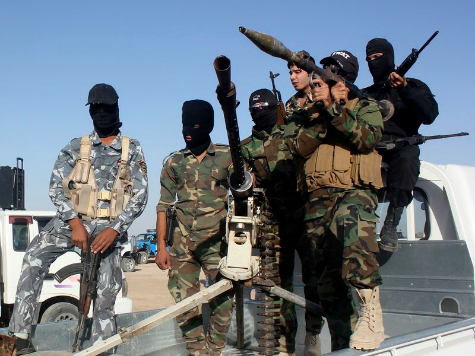The Islamic State, formerly the Islamic State of Iraq and al-Sham (ISIS), has had months to establish its jihadist rule of terror in Raqqa, Syria, its “capital.” As The New York Times reports, ISIS is stealing from banks and redistributing taxes into social welfare and infrastructure, but has been set back by a lack of vocational education.
The New York Times sent an unnamed reporter to Raqqa, to experience first-hand what it is to live under ISIS rule. For Sunni Muslim men who own their own businesses in the city, it is almost preferable to Assad’s rule. ISIS collects $20 every two months from merchants in Raqqa– a fortune for the average salary in the region, used to provide infrastructure, electricity, and water. The taxes are high, but not as high as the bribes formerly paid to President Bashar al-Assad’s officials, and if one manages to stay out of trouble, there is food and water. “In the city of Raqqa, traffic police officers keep intersections clear, crime is rare, and tax collectors issue receipts,” writes the reporter, with locals noting that ISIS “has a clear vision to establish a state in the real meaning of the word… it is not a joke.”
For any men who do not have the privilege of owning a business and are employed as skilled government infrastructure workers– or, worse, for women– the situation does not appear so sunny. ISIS has, The New York Times reports, “paid or threatened skilled workers to remain in their posts while putting loyalist supervisors over them to ensure compliance with Islamic rules.” Imposing “Islamic rules” on hospitals and power plants means savage punishments for anyone straying remotely out of line, and also means that the managers of indispensable public services are often young men with little education more interested in dying on a battlefield than the inanity of bureaucratic work.
The image The New York Times has painted of ISIS as a state, and not a jihadist terror organization, looks much more familiar in its banality than the horrifyingly sophisticated propaganda of Al Hayat Network. It is an attempt at a socialist utopia gone– as all attempts at socialist utopias go– very wrong. Stripped of its religious overtones, the core goal of ISIS is to establish a state in which the state takes money from its citizens and pours it back into creating a comfortable life for them. It aims to provide Muslims with a safe haven with endless food, water, electricity, perfectly paved roads, and an equal lifestyle for all. It looted banks and stripped “infidels” of all their belongings to, allegedly, pour that money into the best interests of Muslims in the “state.”
Instead, in Raqqa, ISIS can only provide electricity for four hours in the day, and is struggling to find anyone competent in its ranks to run City Hall and government services. In Mosul, for weeks reports surfaced that the city was quieter than under the Iraqi government and residents were happy with electricity and food– until ISIS ran out of resources to give and issued an ultimatum that the city’s Christians would have to choose between their home and belongings or their lives.
With seemingly endless resources from looting Christians and ransacking oil fields, ISIS can barely afford to keep the shelves stocked in Raqqa– and in Mosul, food is still rationed. Strip ISIS of its jihadist veneer and that sounds more like the failures of the Venezuelan government than anything going on in the Middle East.
That jihadist mentality contributes heavily to ISIS’s failures, however. A society in which women are forced to cover themselves by law and excluded from participating in the free market; where mannequins must be covered up and foreign criminals— not native civilians– receive the highest posts in society; cannot and will not succeed.
Abu Bakr al-Baghdadi– the Caliph Ibrahim– seems to understand this. He has called upon all the world’s Muslims, particularly targeting doctors and engineers, to come to the “Islamic State” and help build it. He understands that, without professionals to physically build the state, radical Islam alone will not suffice. But imported doctors and engineers– as any Venezuelan exile will tell you– are not enough. A state must have its own universities and produce its own skilled workers to survive, and a socialist economy where dissent is punishable by death is infertile ground for skilled labor. They may kill thousands more in their quest to establish it, but the Islamic State in its current manifestation is little more than a house of cards.

COMMENTS
Please let us know if you're having issues with commenting.